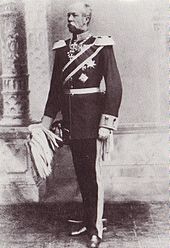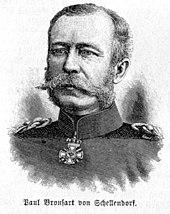Paul Bronsart von Schellendorff
Paul Leopold Eduard Heinrich Anton Bronsart von Schellendorff (born January 25, 1832 in Danzig ; † June 23, 1891 at Gut Schettnienen ) was a Prussian infantry general and minister of state and war .
Life
origin
Paul came from the old Prussian noble family of those von Bronsart von Schellendorff . He was the son of the later Prussian Lieutenant General Heinrich Bronsart von Schellendorff (1803-1874) and his wife Antoinette Martha Elisabeth, née d'Azemar de Rège (born January 5, 1810 in Kassel ; † February 9, 1873 in Hanover ). His younger brother and later successor in the office of Minister of War was Walther Bronsart von Schellendorff .
Military career
After attending grammar school in Danzig as well as the Kulm and Berlin cadet school , Bronsart von Schellendorff joined the Emperor Franz Grenadier Regiment on April 28, 1849 as a second lieutenant . From June 1, 1852, he was adjutant of the fusilier battalion of the 4th Guards Landwehr Regiment and attended the General War School from October 1, 1855 to July 31, 1858 . It then followed on May 1, 1859, his command to the trigonometric department of the General Staff and promotion to Prime Lieutenant on May 31, 1859. With the promotion to captain on February 23, 1861 he was transferred to the General Staff. Then Bronsart von Schellendorf was from September 2, 1862 to June 8, 1864 in the General Staff of the II Army Corps , then resigned in the troop service and became company commander in Grenadier Regiment No. 2 . In May 1865 he returned to the General Staff and became major on December 24, 1865 . On May 23, 1866, he was transferred to the General Staff of the II Army Corps, to which he belonged for the duration of the war against Austria and in the course of which he took part in the fighting at Gitschin and Königgrätz . After the peace was concluded, Bronsart von Schellendorff was again a member of the Great General Staff and on October 13, 1866 was commanded to serve at the War Ministry. He was released from this task on November 21, 1869 and entrusted with the management of the business as head of the mobilization and deployment department in the General Staff.
In the Franco-Prussian War , Bronsart von Schellendorff was a department head in the general staff of the Great Headquarters . On September 1, 1870, he was sent to the Sedan Fortress when the French defenders surrendered to initiate negotiations with Napoléon III. respectively.
After the peace treaty he became colonel and chief of staff of the Guard Corps and in 1876 major general . As such, Bronsart von Schellendorff was appointed commander of the 1st Guard Infantry Brigade and commander of Potsdam on March 12, 1878. This was followed on June 14, 1881, as commander of the 2nd Guard Division and promotion to Lieutenant General on June 28, 1881.
In March 1883, Bronsart von Schellendorff succeeded Georg von Kameke as Prussian Minister of War. Under his leadership, the draft adopted by the Reichstag on March 11, 1887 to increase the peace-keeping strength of the Reich Army was worked on. A number of modernizations also took place, including arming the foot troops with repeating rifles , a new pension law for members of the military and a law on compulsory military service (February 11, 1888). During his time as Minister of War, Bronsart von Schellendorff was also the Federal Councilor , Chairman of the Committee on the Land Army and Fortresses, and Head of the Directorate of the Great Military Orphanage . At the funeral of Wilhelm I , Bronsart von Schellendorff carried the imperial sword in front of the coffin. On April 23, 1888 he was promoted to General of the Infantry with a patent from April 14, 1888.
At his request, Bronsart von Schellendorff was removed from his position as Minister of War on April 8, 1889. Wilhelm II also complied with his request and appointed him commanding general of the 1st Army Corps in Königsberg on June 15 .
Bronsart von Schellendorff died of pneumonia on his Schettnienen estate. He was also the owner of the local goods Samsdorf and Ruhnenberg (Polish: Runka).
family
Bronsart von Schellendorf married on May 30, 1853 in Berlin Rosalie Klara Marie, née Schmidt (* October 6, 1833 in Ölse , † May 9, 1913 at Gut Schettnienen, district of Heiligenbeil ), the daughter of the Prussian secret chamber councilor Heinrich Schmidt and Rosalie von Knobelsdorff. The marriage had seven children, including:
- Maria Klara Rosalie Antonie (born April 8, 1854 in Berlin; † June 20, 1932) ∞ Ferdinand von Stülpnagel (1842–1912), Prussian infantry general
- Rosalie Antonie Agnes (1855-1862)
- Wilhelm Friedrich Hubertus (born December 4, 1861 in Berlin; † September 11, 1914 near Osnagorow), master at Gut Schettnienen, died as a major and battalion commander in the "Hiller von Gärtringen" infantry regiment (4th Posensches) No. 59
- Friedrich Heinrich Bruno Julius (called Fritz , born June 16, 1864 in Berlin; † January 23, 1950 in Kühlungsborn ), Prussian lieutenant general
- Georg Paul Heinrich (born September 12, 1869 in Berlin; † December 16, 1933 there), Prussian officer, most recently a lieutenant colonel . D.
Awards
Bronsart von Schellendorff was head of the grenadier regiment "King Friedrich I." (4th East Prussian) No. 5 from January 27, 1889 . In addition, he had received the following medals and decorations for his achievements in the course of his life :
- Iron Cross 2nd class on September 2, 1870
- Iron Cross 1st Class on December 31, 1870
- Star for the Crown Order II class with swords on the ring on September 18, 1880
- Grand Cross of the Order of the Crown of Italy on March 17, 1883
- Grand Cross of the Order of the Zähringer Löwen on September 20, 1885
- Grand Cross of the Order of the Württemberg Crown on October 1, 1885
- Grand Cross of the Red Eagle Order with Oak Leaves on July 3, 1888
- Stern of the Grand Commander of the Royal House Order of Hohenzollern on April 8, 1889
Works
- A look back at the Tactical Flashbacks. Berlin 1870
- The service of the General Staff. Berlin 1875 (1st edition) - General Jacob Meckel revised the third edition in 1893
- Considerations about a contemporary fencing style of the infantry. Berlin 1891
literature
- Kurt von Priesdorff : Soldier leadership . Volume 8, Hanseatische Verlagsanstalt Hamburg, undated [Hamburg], undated [1941], DNB 367632837 , pp. 416-423, no. 2675.
- Genealogisches Handbuch des Adels , Adelige Häuser A Volume XVI, p. 181. Volume 76 of the complete series. CA Starke Verlag, Limburg (Lahn) 1981.
- Bußmann, Walter: Bronsart von Schellendorf, Paul Leopold Eduard Heinrich Anton. In: New German Biography (NDB). Volume 2, Duncker & Humblot, Berlin 1955, ISBN 3-428-00183-4 , p. 636 f. ( Digitized version ).
Web links
- Literature by and about Paul Bronsart von Schellendorff in the catalog of the German National Library
- Literature list in the online catalog of the Berlin State Library
Individual evidence
- ^ Kurt von Priesdorff: Soldatisches Führertum. Volume 6, Hanseatische Verlagsanstalt Hamburg, undated [Hamburg], undated [1938], DNB 367632810 , p. 507, no. 2136.
- ^ German loss lists of the First World War: Edition 94 of October 11, 1914 (Prussia 48), p. 1035.
| personal data | |
|---|---|
| SURNAME | Bronsart von Schellendorff, Paul |
| ALTERNATIVE NAMES | Bronsart von Schellendorff, Paul Leopold Eduard Heinrich Anton (full name) |
| BRIEF DESCRIPTION | Prussian officer, general of the infantry, Minister of War of Prussia |
| DATE OF BIRTH | January 25, 1832 |
| PLACE OF BIRTH | Danzig |
| DATE OF DEATH | June 23, 1891 |
| Place of death | Good Schettnienen |



